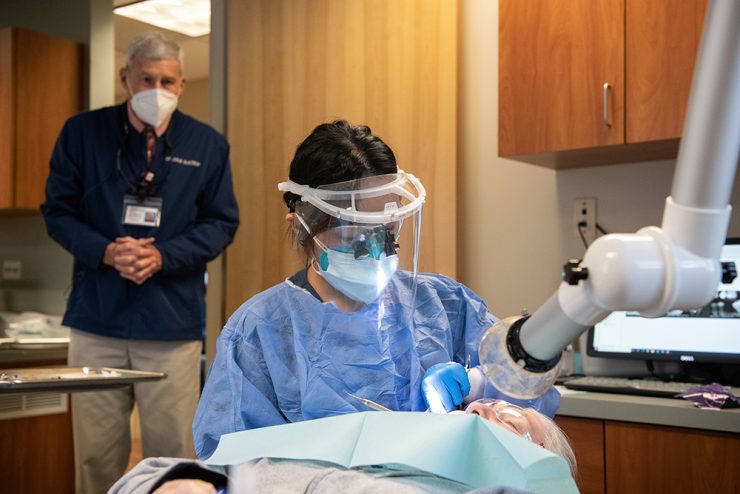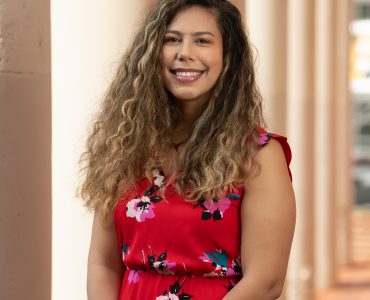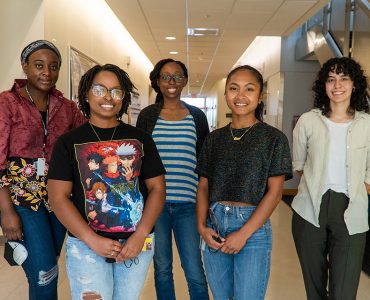Fear, uncertainty, the unknown. Many University of Maryland, Baltimore (UMB) students have dealt with those emotions for the past two years during the ups and downs of the COVID-19 pandemic. But one group of students has faced perhaps an even more unusual circumstance: They are earning two-year degrees, so the pandemic has been a part of their entire time studying and training at UMB.
UMB offers numerous two-year programs such as the Bachelor of Science Dental Hygiene and Advanced Education in General Dentistry (AEGD) programs at the University of Maryland School of Dentistry (UMSOD) and the Bachelor of Science in Nursing Program at the University of Maryland School of Nursing.
Some students in those programs said they faced challenges from the pandemic even before arriving at UMB in fall 2020. For instance, Hee Yeon Kim, who is completing the dental hygiene program, said the pandemic indefinitely postponed her permanent residency interview.
“When the pandemic first hit, I thought it would last about six months. However, things escalated quickly, and my permanent residency interview was canceled by U.S. Citizenship and Immigration Services due to the pandemic,” she said. “I had been counting on becoming a permanent resident for UMB to consider me to be an in-state student, so I thought I would have to give up the admission for at least a year. Thankfully, UMB granted me in-state status, so I was able to pursue my dream without delay.”
Max O’Sullivan, who was an active member of the Navy for 12 years before coming to UMB and will graduate with a Bachelor of Science in Nursing degree, was working at a military trauma center in North Carolina when the pandemic started.
“Moving here was stressful on my wife because of the military restrictions: I couldn’t leave our duty station. She had to come look at a house with her mom in Maryland, and I was not able to come, so that was the first challenge,” he said. “The second challenge was we moved here at 24 weeks’ pregnant expecting our first child, so there was kind of fear of the unknown coming into a new place.”
Challenges and Positives of Online Learning
Once at UMB, the challenges continued when the academic year got under way in fall 2020 since many classes had to be offered online.
“It has been very frustrating. With my military experience, nursing is very hands-on: You learn by doing, being in person, engaging with people, patients, instructors,” O’Sullivan said. “So for me, not having that was actually a very big challenge. As far as coursework, imagine taking the hardest courses you’ve ever taken, and doing it through Zoom.”
Kim saw the bright side of online classes: “I loved waking up five minutes before my lectures for the didactic courses and wearing my fuzzy socks all day. Professors were attentive to the students’ needs and kept us encouraged,” she said.
As the pandemic wore on, these students were able to get hands-on instruction working in clinics and the hospital, though Venkata Ratna Kumar Rudravaram, DDS, a resident in UMSOD’s AEGD program, said he felt uncertainty when working in the AEGD clinic.
“It was hard to communicate with patients. I struggled to get used to wearing respirators and surgical masks,” he said. “Patients were scared and apprehensive to make dental appointments, and I was also worried about going to school and getting sick. It was a very uncertain time, and that was a big obstacle to overcome.”
He added, “UMB did an amazing job providing all health care providers with COVID vaccinations at the very beginning and providing extra protection.”
Like many others, they also said they felt isolation because of COVID-19 restrictions and the lack of socialization with their peers.
“My whole career, people have said you need to find study groups while you’re in nursing school. Because of COVID, for my entire four semesters, I did not have a single study group, so a lot of it was relying on yourself,” O’Sullivan said. “But if you’re struggling with something, how are you going to get better at it? So it was becoming very resourceful, meshing styles of studying together to create what worked best for me. And it differed every semester.”
Meaningful Connections
Patty Alvarez, PhD, MS, assistant vice president of student affairs, said these students experienced UMB in a unique way.
“For some students, becoming engaged ‘on campus’ was a little more challenging as they balanced the stress of the pandemic and its impacts on their lives and academic experiences. For other students, it was a little easier to attend online events or take advantage of student support resources and services due to the virtual format,” she said. “I hope that students were able to make meaningful connections with their peers that will continue beyond graduation.”
Some students found resources at UMB to give them support like Kim, who participated in the Crazy Stressed Asians discussion group.
“I have become aware of how some view people like myself differently,” she said. “The group has been a great comfort.”

‘Best Years of My Life’
In spite of what they’ve had to overcome during the pandemic, the students said they feel pride in all they have accomplished.
“It gave me immense pleasure providing service to people who were in pain during the pandemic because a lot of private offices were shut down,” Rudravaram said. “I remember on some days, only the AEGD clinic was seeing and treating patients; all other clinics were closed. I felt a great sense of purpose, and it reminded me why I enjoy dentistry so much.”
Kim was a finalist for Grid Pitch 2021, a student incubator program at the University of Maryland Graduate School.
“The venture idea I entered with is an oral hygiene product subscription plan that promotes children’s oral health through letters from the Tooth Fairy. By the time I graduate, I will have registered it as a nongovernmental organization [NGO],” said Kim, who hopes to work part time in a public health job and part time in a private practice job as well as make her NGO a reality.
The students said that earning their degrees during the pandemic has taught them to be patient and to remain positive as they face challenges.
“You can’t control everything. You need to make sure that you remain calm and adapt to the environment or the situation,” O’Sullivan said.
Rudravaram is thankful for his time at UMB.
“Despite having to live through a pandemic, my experience at UMB has been the best years of my life,” he said. “I’m so thankful for my AEGD family, and I have built lifelong friendships. The people I’ve met while in AEGD are so talented, and the faculty are so knowledgeable.”




